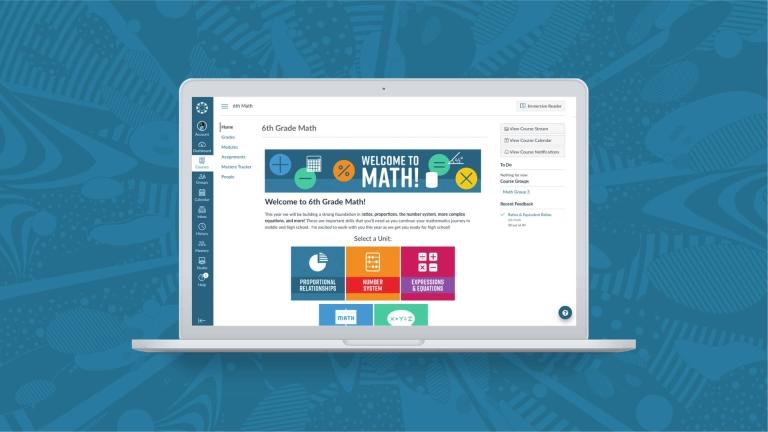
In its early years of innovation, an LMS was used for basic communication and storing educational resources. Now, an LMS comes with modern features that can enhance the entire teaching and learning experience. In short, learning management systems have evolved from an optional and limited class tool to becoming an essential part of the academic ecosystem.
As technology transformed the learning industry, the need for a robust and dependable LMS increased. This demand influenced a new generation of cloud-based learning management systems. As management system norms transitioned from on-premise to the cloud, learning was revolutionized, resulting in cost and time savings for schools and institutions as well as increased scalability.
It’s clear learning management systems have come a long way. And it's now common for most modern systems to have cloud-based functionality. However, Canvas LMS was born in the cloud – providing advanced features and capabilities since day one. In this article, we’ll learn more about the importance of having a cloud-based LMS and explore Canvas as the leading cloud-based LMS solution.

What is a Cloud-Based LMS?
A cloud-based LMS, or hosted LMS, is hosted off-premise, freeing up servers and resources. Simply put, cloud-based LMSs are not tied down and are accessible via the internet, reducing costs and improving performance. Let’s take a look at some of the benefits.
Cost efficiency: Using a cloud-based LMS reduces ongoing operational costs. Schools and institutions often pay a manageable subscription that covers updates and maintenance. This budget-friendly approach attracts organizations of all sizes.
Quick implementation: A traditional LMS can come with a complex setup. Simplify the implementation process with cloud-based LMS, setting it up with ease. Learn more about LMS migration.
Impeccable Security: Data security and privacy is a top priority for learning organizations. Schools and institutions can expect routine data backups and advanced security. And in cases of emergencies, the cloud-based system may have disaster recovery.
High Scalability: Cloud-based solutions are designed to scale with the learning organization's needs. Whether the school is small or large, a cloud-based LMS can accommodate and evolve to fit the size and complexity of any organization. This scalability provides reliability and flexibility, fitting for institutions expected to undergo change.
Minimal Maintenance: Avoid managing servers, troubleshooting technical issues, and shutting down the site for software updates – all common in an on-premise LMS. With a cloud-based LMS, maintenance is in the hands of the provider. Institutions can then focus on what’s important: teaching and learning.
Enhanced Learner Experience: A cloud-based LMS makes learning more accessible and immersive to learners. Mobile compatibility is made easy, allowing learners to engage at any time. In addition, other advanced tools and features drive a modern learning experience.
Cloud-based LMS vs. Other Learning Management Systems
With so many LMS options available, it can be hard to assess what would work best for your organization. Let’s take a quick look at other LMS types and how they compare to a cloud-based LMS.

On-premise LMS: An on-premise LMS offers a high degree of customization and control since it’s typically hosted on the school or institution's server. This level of authority comes with additional costs and responsibilities. With an on-premise LMS, the initial integration can take longer than usual as additional hardware and software are set up. Unlike the cloud-based LMS, the organization is responsible for maintaining server management.
Open-source LMS: Similar to an on-premise solution, an open-source LMS offers extensive customization and adaptability. However, institutions can expect higher ownership costs, long implementation, and complex maintenance. With a cloud-based LMS, institutions can find a better approach, tailoring their LMS experience without the hassle of maintenance.
Customized LMS: A customized LMS requires extended development time and ongoing maintenance. This comes with significant time commitments and substantial costs. Organizations can adapt cloud-based solutions to fit their needs, receiving a customized experience without overpaying for a customized LMS.
Why Canvas Elevates the Cloud LMS Experience
Canvas is the leading cloud-based LMS solution. Its robust and adaptable features elevate the cloud learning experience. Further, the Instructure Learning Platform supports all use cases, enhancing academic courses, assessments, communications, and analytics. Institutions can easily tailor learning experiences, receiving customizable options without the extensive and costly setup. This amount of customization and flexibility facilitates a diverse approach to learning.
Canvas LMS's user-friendly interface makes it easy to navigate and engage with classmates and coursework. The learning environment is further enhanced through Canvas LMS collaboration and engagement tools. These tools are supported by the system's simplified integration and scalability.
Common Questions About a Cloud LMS
As schools and institutions invest in the best LMS for them, they want to know how the platform will benefit their communities. In addition, it’s important to note how to best use a cloud-based LMS. Let’s address some of the common inquiries related to cloud LMS.
Setting Up & Customizing your Cloud LMS: Implementation and setup are simplified with a cloud LMS. With a wide range of configuration options, organizations can personalize how their LMS works for them. Schools and institutions can incorporate branding, define learning structures, and adapt features to align with their needs.
Ensuring Data Privacy in the Cloud LMS: As technology continues to expand in education, institutional data and security are prioritized. A cloud LMS includes regular data backups, access controls, encryptions, and robust security protocols. Instead of being fully responsible for its organization's security, the responsibility is shared with the cloud LMS administrator.
Exploring Integration Options with Cloud LMS: Integrations are an essential part of the implementation process. Functionality is enhanced when tools can third-party tools can integrate with the platform – providing a wide range of resources. When selecting an LMS, assess what's compatible with that system.
Want to learn more? Check out our LMS features article to learn what comes with a cloud-based LMS.
Joining the Cloud
To experience the benefits of a cloud-based LMS firsthand, look at how to select the best LMS for your organization.
Related Content
 Teaching-With-Tech-10-Benefits.jpg
Teaching-With-Tech-10-Benefits.jpgBlogs
 canvas-biz-investment.jpg
canvas-biz-investment.jpgBlogs
 wooclapft.png
wooclapft.pngBlogs
